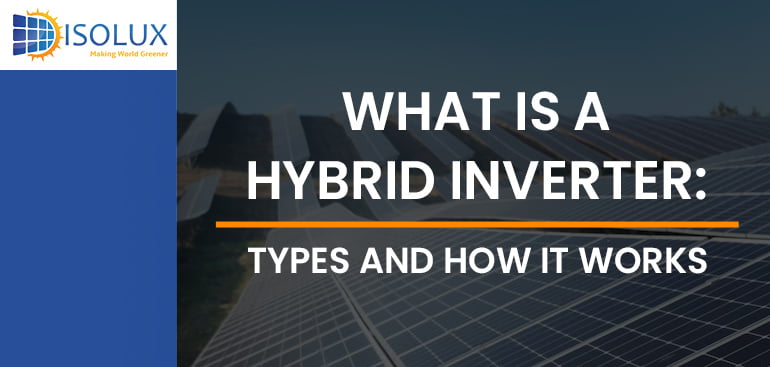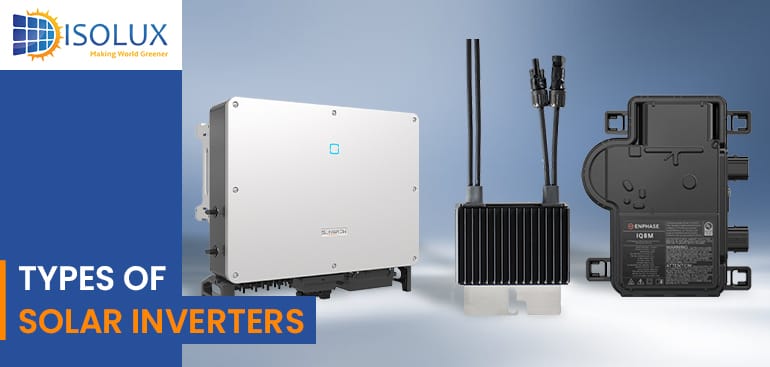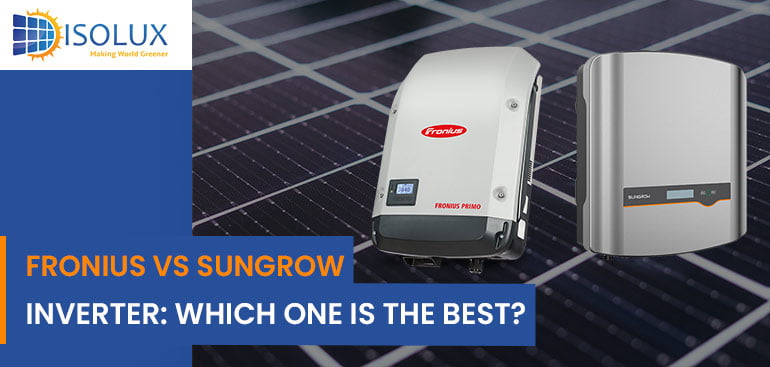In a world where renewable energy sources are becoming more and more popular, residential and commercial properties are looking for ways to optimize their energy consumption. Hybrid inverters help to optimize usage as solar panels, batteries, and electric grids work together to power the required energy needs.
Let’s explore the hybrid inverter features, benefits, and applications in the context of modern energy needs.
What is a Hybrid Inverter?
A hybrid inverter is a combination of a solar inverter and solar battery that manages the power of your solar panel system, batteries, and the grid at the same time.
It facilitates the intelligent transfer of surplus energy generated by solar panels to batteries. As solar energy production peaks during the daytime while energy usage high in the evening.
How Does a Hybrid Inverter Work?
A hybrid inverters work by managing the flow of electricity. Between the solar panels, battery storage system, and the electrical grid. When sunlight is available, the solar panels generate DC power, which converts into AC power by the inverter for immediate use in the home. Any excess energy stored in the battery is for later use.
During low sunlight or at night when solar energy production reduces. The hybrid inverter draws power from the battery to supplement the energy needs of the household. It also has the ability to draw power from the electrical grid ensuring a continuous and reliable power supply.
Types of Hybrid Inverters
There are several types of hybrid inverters available in the market. Each offers different features and capabilities. Here are three common types:
Inverter/Charger Hybrid:
This type of hybrid inverter combines functionalities and a battery charger. It can convert DC power from solar panels into AC power. For immediate use in the home, as well as charging the battery bank connected to the system. Inverter/Charger hybrids are in residential and commercial settings.
Inverter/Charger/Solar Charge Integrated:
This type of hybrid inverter goes a step further by integrating solar charge capabilities. Besides converting DC power from the solar panels into AC power. The solar battery storage has a solar charge controller to regulate the charging of the solar batteries. This integrated design simplifies the installation process. Which provides a comprehensive solution for solar energy systems with battery backup.
Grid-Tie Hybrid: A grid-tie hybrid inverter designed to work in conjunction with both the electrical grid and a battery storage system. It can feed excess solar power back into the grid and also store energy in the batteries for later use. This type of hybrid inverter allows for energy independence and the ability to use stored energy during grid outages.
Read Related Blog: Why Should You Go For a Hybrid Solar System
Can a Hybrid Inverter Work Without a Battery?
Yes, a hybrid inverter can work without a battery. In such cases, the hybrid inverter operates as a standard grid-tied inverter. It converts DC power from the solar panels into AC power for immediate use in the home feeding the excess energy back into the electrical grid. Without a battery, yet, there is no provision for energy storage, which means the system will not provide backup power during grid outages.
Do I Need a 3-Phase Hybrid Inverter?
The need for a 3-phase hybrid inverter depends on the electrical setup of your home or business. Most residential properties have a single-phase electrical connection. While commercial properties have a three-phase connection. It needs requires higher power demands and needs equal energy distribution.
Hybrid Inverters vs Normal Inverters
Hybrid inverters differ from normal inverters in their ability to work. While normal inverters convert DC power generated from solar panels into AC power for immediate use. It also has the functionality to store excess solar energy in batteries and use it when the sun is not producing energy. This enables hybrid inverters to provide power backup during grid outages.
What are the Advantages of a Hybrid Inverter?
Energy independence:
A hybrid inverter with a battery storage system allows you to store excess energy and use it when needed. Reducing reliance on the electrical grid and providing backup power during outages.
Increased self-consumption:
By storing excess solar energy and using it later. It helps maximize the self-consumption of generated power. Reducing reliance on grid electricity and lowering utility bills.
Optimized energy management:
Hybrid inverters manage the flow of electricity between solar panels, batteries, and grid. Ensuring efficient use of available energy sources and minimizing wastage.
Environmental benefits:
Utilizing solar energy and reducing dependency on fossil fuel-based electricity helps lower carbon emissions. Which contributes to a cleaner and greener environment.
What are the Disadvantages of a Hybrid Inverter?
Higher upfront cost:
Hybrid inverters with battery storage systems can be more expensive. Compared to standard grid-tied inverters due to the added components and functionality.
Maintenance requirements:
Battery systems need periodic maintenance and monitoring to ensure optimal performance and longevity. This may involve extra costs and effort.
Limited battery lifespan:
Batteries used in hybrid inverters have a limited lifespan. That will need replacement adding to the system’s cost.
Complexity:
Hybrid inverter systems involve more components and intricate wiring. Compared to standard inverters, which may need professional installation and troubleshooting.
When Should You Use a Hybrid Inverter?
Hybrid inverters are particularly useful in the following scenarios:
Off-grid living:
If you live in a remote location with limited or no access to the electrical grid. A hybrid inverter with a battery system can provide a reliable and independent power supply.
Maximizing self-consumption:
If your goal is to reduce reliance on grid electricity and maximize consumption of solar energy. It also allows you to store excess energy for later use when you have battery.
Backup power:
If you live in an area with frequent power outages or unreliable grid supply. A hybrid inverter with a battery system ensures continuous power supply during outages.
Time-of-use optimization:
Some hybrid inverters offer time-of-use (TOU) optimization. Allowing you to use stored energy during peak electricity tariff hours.
Off-Grid Inverters vs Hybrid Inverters
Hybrid inverters and off-grid inverters are both designed for solar energy systems but have different purposes:
Hybrid inverters: Hybrid inverters are grid-tied inverters with battery storage capability. They can operate in both grid-connected and off-grid modes. Providing backup power during outages and maximizing the self-consumption of solar energy.
Off-grid inverters: Off-grid inverters are designed for standalone, off-grid systems that are not connected to the electrical grid. They convert DC power from solar panels into AC power for immediate use and charge batteries for energy storage. Off-grid inverters do not have the ability to feed excess energy back into the grid.
Conclusion
In conclusion, a hybrid inverter is a versatile device that combines the functionalities of a grid-tied inverter and a battery-based inverter. It enables efficient energy management, increased self-consumption of solar power, and backup capabilities. Yet, they come with higher upfront costs, maintenance requirements, and added complexity. The decision to use a hybrid inverter depends on your specific energy needs, location, and budget. Consulting with a reputable local solar installer in Sydney, help you in choosing the best inverter for your solar system.
Read Next Blog:




